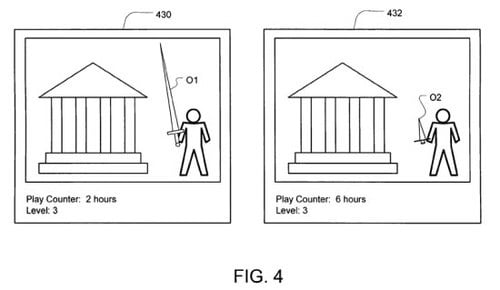Sony's Great Idea: Demos That Become Less Fun When Played
When a game developer releases a demo, it's typically intended to entice players into first trying and then purchasing the full version. In keeping with that goal, demo versions of a game are (usually) designed to be fun. This is the stuff of Game Design 101 for most of us, but a crack team of cutting-edge gaming researchers at Sony have applied for a patent based on a novel concept—game demos that become progressively less fun the more you play. Sony refers to this as "feature erosion"; the patent application can be viewed in full here.
"Redefined" Is Not A Synonym For "Better "
The patent abstract states:

The image above depicts an RPG/MMO style game in which the player is initially wielding a massive two-handed sword. Four hours later, his weapon has shrunk to the size of a limp daisy, leaving us with the impression that it had actually been suffering from extended priapism.

The next image shows a series of race tracks (read the images top-to-bottom, left-to-right). Initially, all four tracks are available to our level three player. As he plays more games, the number of available tracks goes down until only the default track A is available. The last box shows all four tracks available again, after the gamer has bought the full version.
Did An Actual Person Come Up With This?
If this doesn't sound like fun to you—and we bet it doesn't—it's because the entire concept runs against our ingrained concept of fairness. A demo or program that provides limited functionality or play time is one thing; a game that's purposefully designed to take your progress away after a certain point in an admitted attempt to get you to buy once you've been hooked is something altogether different.
Even if such a system didn't seem to be such an intrinsically cheap trick, implementing it turns the concept of gaming on its head. If we all start a game at Level 1 or Track A, at what point does the system arbitrarily decide to start taking away progress? Perhaps most importantly, what incentive can you possibly offer players to play a game when they know you'll start artificially reversing their progress at some point?
"Redefined" Is Not A Synonym For "Better "
The patent abstract states:
A demonstration video game permits garners [gamers, we assume] a more complete game experience while promoting a desire to acquire permission to continue playing. In some embodiments, a video game is implemented with trigger metrics. While a user may initially experience most or all of the full version of the game in a demonstration mode, the mode implements trigger metrics to erode game play characteristics, such as character, object, event and/or environmental features, during video game play in the demonstration mode. Thus, fewer play characteristics may be available as play continues in this mode. Multiple trigger metrics may gradually and successively limit play characteristics as play with the game continues. As the gamer loses functionality, the user may be prompted with the trigger metrics to purchase permission to continue the game in a non-demonstration mode that disables the trigger metrics and returns the game to the more complete version.The idea behind this dubious concept is that gamers will become hooked on a game while it's still in demo, then squawk unhappily as features and abilities they've unlocked begin to disappear. In order to prevent this, our player ponies up for the full version, which then unlocks/restores the previously learned abilities or options. Sony offers several diagrams of how this feature might be implemented:


Did An Actual Person Come Up With This?
If this doesn't sound like fun to you—and we bet it doesn't—it's because the entire concept runs against our ingrained concept of fairness. A demo or program that provides limited functionality or play time is one thing; a game that's purposefully designed to take your progress away after a certain point in an admitted attempt to get you to buy once you've been hooked is something altogether different.
Even if such a system didn't seem to be such an intrinsically cheap trick, implementing it turns the concept of gaming on its head. If we all start a game at Level 1 or Track A, at what point does the system arbitrarily decide to start taking away progress? Perhaps most importantly, what incentive can you possibly offer players to play a game when they know you'll start artificially reversing their progress at some point?

